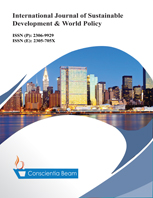NGO Programming and Policy Advocacy in the Land Sector in Zimbabwe
Abstract
Across the world, NGOs act as critical players in the promotion of socioeconomic by providing gap filling interventions. This article examined NGOs working in the land sector in Zimbabwe, paying special focus on their formation dynamics, programming, research and policy advocacy. The study identified around 155 NGOs working in the land sector. While NGO advocacy during the first decade was restricted to community welfare issues, by 2008, it had expanded to include topical issues such as land allocation, land rights, land use, water rights, gender rights and human rights, among others. NGOs such as the African Institute of Agrarian Studies were at the forefront, cogently articulating land reform discourse in Zimbabwe as a global phenomena with parallels across the world. Notwithstanding this, NGO land advocacy faced several structural and operational challenges. It suffered from a highly polarized environment, blurred lines of authority, mutual mistrust between State and NGOs, reluctance by donors to provide funds for land advocacy as well as deep-seated discrepancies in the conceptualization of land reform issues. Global experiences suggest that effective NGO land advocacy is most likely where there is mutual trust between state and non state policy actors.

